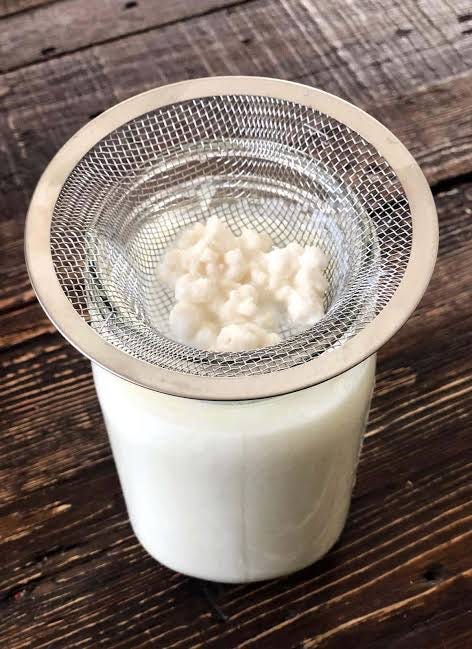Fermented Fairytales
Joe Flaherty is an #EatNZKaitaki and a budding food writer based in Ōtepoti/Dunedin, here he explores the world of fermentation through kefir.
Recently I made kefir for the first time and it didn’t help me see in the dark.
Kefir is a fermented milk product that originated in the North Caucasus and like many fermented foods has recently had a resurgence in popularity. It’s great stuff, like yoghurt but with a distinct creaminess and tang that sets it apart. It’s also one of the easier ferments to make: just add your kefir starter to some milk and leave it to ferment overnight. I love fermented food, so this was great, and I really enjoyed how different it was from yoghurt. However, I noticed something about the kefir starter itself that bugged me (I would like to state for the record that kefir as a concept is not on trial here, rather the marketing around a kefir starter I now regret buying).
Kefir is fermented with kefir grains which are a symbiotic community of bacteria and yeast, like a SCOBY specifically for kefir. I won’t name the brand I used as I’m about to trash it, but all you need to know is that it is a company that promotes diet plans and products to improve gut health. On the leaflet that comes with this product is a recipe for “Young Coconut Kefir”, a trademarked product. This product promises that it “stops cravings for sugar, aids in the digestion of all foods, while toning and cleansing the intestines and the liver, eases aches and joint pains, clears up skin problems like brown liver spots, skin tags, moles, etc., improves vision, makes hair, skin, and nails healthier because of its high mineral content… and cleanses the endocrine system (adrenals, thyroid, pituitary, ovaries).” I’ve quoted that in its entirety to show just how many things this product claims to do. I wouldn’t be surprised if it went on to read “cures most types of cancer, ends world hunger, prevents all war…” However, on the front of the packet, it has an asterisk that says these claims are not backed up by the U.S. Food and Drug Administration. The question, then: should making these types of claims be legal?
Let’s compare with a similar example: The yoghurt brand Ativia was forced to pay a $45 million settlement in 2010 for marketing their product as “clinically” and “scientifically” proven to boost one’s immune system and regulate digestion. The ad campaign for this product claimed that the yoghurt had ‘special bacterial ingredients’ that justified the 30% higher price difference compared to other brands of yoghurt. These claims were found to be false, although Dannon, the parent company, denies any wrongdoing and claims it settled the lawsuit to prevent any further expense. It’s interesting what falsely claiming scientific backing can land you in, especially when you can seemingly skirt round the problem with an asterisk. But it’s not much different, is it? The Young Coconut Kefir seems to say, “but you don’t have to believe us! It’s up to you!” Which I think is just a huge cop-out, and one very small step removed from what got Ativia in such hot water.
Sadly, I believe that fermented foods may be falling into the pit of late-stage capitalism. We are in the age of probiotic buzz words: our understanding of gut health has not yet caught up with our enthusiasm toward gut health, so current marketing of fermented foods has transformed into just chucking out random terms that sound good to consumers. Does Young Coconut Kefir™ actually “aid in the digestion of all foods”? How does one even go about testing that hypothesis? What was the sample size? Who paid for the research? Was there even any research conducted? These are the questions we need to start asking. We need to be more critical of food marketing as a whole, and be aware that as fermented foods continue their astronomical rise in popularity, so too will these outrageous claims.
In an article in The Guardian, Kimberly Wilson, psychologist and author, describes how the short-chain fatty acids produced by microbial fermentation of fibre in the gut are similar to the makeup of some mood-stabilising prescription drugs, and goes on to hypothesise that future prescriptions to treat mental health may include certain types of fibre for our gut microbes to digest once our understanding of gut health has increased. This is the type of messaging we should be paying attention to when it comes to our microbial makeup: tentative steps in the right direction, as opposed to claims that fermented coconut water “clears up skin problems and improves vision.” If fermented products could help us see in the dark, I think we’d know by now, wouldn’t we?
Follow along on Joe’s writing journey @jozephcooks




